It Take Five to Tango
December 2004
 “There are three ways to deal with turning 40,” says pianist Jeffery Watson (MM ’88): “You can have an affair, buy a new car, or join a tango band.” Watson chose the third, and he’s very happy he joined the tango ensemble QuinTango in 2003.
“There are three ways to deal with turning 40,” says pianist Jeffery Watson (MM ’88): “You can have an affair, buy a new car, or join a tango band.” Watson chose the third, and he’s very happy he joined the tango ensemble QuinTango in 2003.
What leads a “blond, Scottish-Irish, classically trained pianist” – as Watson describes himself – to the sinuous, sexy, quintessentially Latin music of tango? Watson, a former student of Rebecca Penneys, admits that playing tango wasn’t exactly in his career line; moving to Washington, D.C. after graduation, he made a name as an interpreter of contemporary American music, and was until recently executive director of the Capitol Hill Arts Workshop. His total experience with the music of tango was as a substitute performer for two concerts by the Pan-American Symphony.
He declined further requests to play the music until he was asked to substitute for the original pianist of QuinTango, Bruce Steeg, who had fallen ill with throat cancer; hearing a tango CD, he was suddenly attracted to the music. When Steeg died in 2003, Watson decided to “quit the day job” and take a chance with the group; he is now a happy, and very busy, tango musician. “The music is wonderful,” says Jeffery. “It runs the full gamut of emotions, and people respond to it immediately.”
QuinTango was founded by Joan Singer, a violinist who fell in love with Latin music while living in Mexico. The group consists of a pianist, two violinists, a cellist, and a bass – more “classical” than a typical tango band, but a valid approach to the music.
Watson has already traveled with the group to Mexico and Argentina – where there is “a very committed tango community” (in his words) that definitely knows good tango playing from bad. QuinTango passed the test with flying colors: “They loved it! We were playing, and 80-year-old Argentinean women in house dresses were dancing. It was crazy.”
As with other types of popular music, the rhythmic nuances and intricate voicings of tango are often unwritten, and Watson received pointers in idiomatic playing from outstanding Buenos Aires musicians. QuinTango was also a hit at a concert at the U.S. Embassy in Buenos Aires; you can see scenes from it, and hear music files from the group’s CDs, at www.quintango.com.
AKA Harpist K
November 2004

 Harpist Jung Kwak (MM ’98) is one of the leading classical musicians in her native South Korea. She made her debut at age 14 with the Seoul National Symphony, has toured with Zubin Mehta and the Israel Philharmonic Orchestra, recently performed with the Tokyo Quartet, and is a popular soloist with Korea’s leading orchestra, the Korean Broadcasting Symphony (KBS). Now, the former student of Kathleen Bride, using the nom de harpe Harpist K, is also climbing the Korean charts with a new age-pop CD called Vivace, performing on a shocking pink electric harp she designed herself. The CD is the harpist’s first for Universal Music.
Harpist Jung Kwak (MM ’98) is one of the leading classical musicians in her native South Korea. She made her debut at age 14 with the Seoul National Symphony, has toured with Zubin Mehta and the Israel Philharmonic Orchestra, recently performed with the Tokyo Quartet, and is a popular soloist with Korea’s leading orchestra, the Korean Broadcasting Symphony (KBS). Now, the former student of Kathleen Bride, using the nom de harpe Harpist K, is also climbing the Korean charts with a new age-pop CD called Vivace, performing on a shocking pink electric harp she designed herself. The CD is the harpist’s first for Universal Music.
There is a strong Eastman alumni connection to Vivace: most of the compositions and arrangements are by Jesse Krebs (MM ’98), and Jung Kwak’s supporting musicians include bassist Ike Sturm (BM ’00, MM ’03), guitarist Ryan Ferreira (BM ’02), and pianist Gary Versace (MM ’93). The lavishly produced Vivace package includes the music CD, and also a DVD with a music video of the title track and a “Making of Vivace” feature.
Besides, Jung Kwak recently received a tremendous honor: she was appointed chair of the 2008 World Harp Contest, to be held in Seoul.
Eastman Composer is Competition Finalist
October 2004

 Afterlight, an orchestral piece by Associate Professor of Composition Carlos Sanchez-Gutierrez, is one of five finalists in the Malaysian Philharmonic International Composers Competition, chosen from hundreds of entries from composers all over the world. Sanchez-Gutierrez, who joined the Eastman faculty in 2003, found out about the competition from one of his students, submitting his entry just before the cut-off date of the composer’s 40th birthday.
Afterlight, an orchestral piece by Associate Professor of Composition Carlos Sanchez-Gutierrez, is one of five finalists in the Malaysian Philharmonic International Composers Competition, chosen from hundreds of entries from composers all over the world. Sanchez-Gutierrez, who joined the Eastman faculty in 2003, found out about the competition from one of his students, submitting his entry just before the cut-off date of the composer’s 40th birthday.
Sanchez-Gutierrez will visit Kuala Lumpur, Malaysia, from November 23-27, to take part in master classes and to hear Afterlight conducted by the orchestra’s Associate Conductor Kevin Field. (The orchestra’s performance hall is located in Kuala Lumpur’s Petronas Towers, the tallest building in the world – 1,453 feet high.) The winning composer will receive $30,000, commissions for a chamber work and another orchestral work, and repeated performances during the orchestra’s 2005-2006 season. Besides the grand prize, Afterlight and the other finalists will also be eligible for a separate Audience Prize. For more information on the orchestra and competition, visit www.malaysianphilharmonic.com.
Sanchez-Gutierrez is currently writing a choral piece for the San Francisco choir Volti, and Five Pieces for Orchestra, written for the Johns Hopkins Symphony, both scheduled for March 2005 premieres. In April, Eastman will present his chamber opera Just Look and a concert of his chamber music. For more information about Carlos Sanchez-Gutierrez, and to hear audio samples of Afterlight and other compositions, visit www.carlossg.com.
Semper Musicus
September 2004
 In August, Chief Warrant Officer Kenneth W. Megan, Jr. (BM ’73) was appointed Director of the United States Coast Guard Band – only the sixth in the 80-year history of the Band, based in New London, Connecticut. Megan will officially replace Captain Lewis J. Buckley on October 1, pending approval by the United States Senate and President George W. Bush. Megan joined the Coast Guard Band in June 1975, and was appointed the band’s Assistant Director in July 1986.
In August, Chief Warrant Officer Kenneth W. Megan, Jr. (BM ’73) was appointed Director of the United States Coast Guard Band – only the sixth in the 80-year history of the Band, based in New London, Connecticut. Megan will officially replace Captain Lewis J. Buckley on October 1, pending approval by the United States Senate and President George W. Bush. Megan joined the Coast Guard Band in June 1975, and was appointed the band’s Assistant Director in July 1986.
Megan’s Eastman training in music education, composing, and arranging has served him well in his 29 years with the organization. Besides a musician and arranger, Megan has been the Band’s assistant director, director of public information, producer of its radio broadcast series, and supervisor of the Band’s popular Young People’s Concerts and Recital Series. Megan has earned the Coast Guard Meritorious Service Medal, two Coast Guard Commendation Medals, and the Coast Guard Achievement Medal.
During the Coast Guard Band’s visit to the former Soviet Union in June 1989, Megan coordinated the events to set up the first tour of an American military band in that country – and conducted a joint performance of Sousa’s “Stars and Stripes Forever” with the Leningrad Military District Band.
For more information about the United States Coast Guard Band and Megan’s appointment, visit www.uscg.mil/band.
Bassoonist Wins Avery Fisher Career Grant
September 2004
 The bassoon is traditionally somewhat overlooked in the concert repertory, but Peter Kolkay (MM ’00) is taking the lowest woodwind instrument to new heights. In 2002 he became the first bassoonist to win the Concert Artists Guild International Competition in its 51-year history; and in May 2004, he won one of the most prestigious prizes for young musicians, an Avery Fisher Career Grant – again, the first bassoonist ever to do so.
The bassoon is traditionally somewhat overlooked in the concert repertory, but Peter Kolkay (MM ’00) is taking the lowest woodwind instrument to new heights. In 2002 he became the first bassoonist to win the Concert Artists Guild International Competition in its 51-year history; and in May 2004, he won one of the most prestigious prizes for young musicians, an Avery Fisher Career Grant – again, the first bassoonist ever to do so.
Peter is visiting assistant professor of bassoon at West Virginia State University, but his concert calendar for 2004-2005 is also well filled. He’ll play a special quintet version of Peter and the Wolf at New York’s 92nd Street Y, give recitals in Chicago and Utica, and tour the west coast with the chamber ensemble Concertante.
Peter is noted for his performances of contemporary music, particularly the chamber works of Elliott Carter; he also performed under John Adams in the opening concert of Carnegie Hall’s new performance space, Zankel Hall. He will join fellow bassoonist Rufus Oliver in the first performances of a Concerto for Two Bassoons and Orchestra by American composer Harold Meltzer – a piece commissioned by Concert Artists Guild to showcase Kolkay’s talent.
For more information on Peter Kolkay, visit the Concert Artists Guild website at www.concertartists.org.
“Seascapes” for Sibley
June 2004
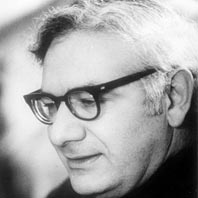 Alumni Weekend 2004 will have added excitement this year, with the premiere of a new work by a Pulitzer Prize-winning composer who is also an Eastman alumnus. Four Seascapes for Chorus and Orchestra by Dominick Argento (PhD ’58) will be performed October 16 in the renovated Eastman Theatre, by the Eastman-Rochester Chorus and Eastman Philharmonia, led by Professor of Conducting William Weinert. This will be a free concert that also includes Neil Varon conducting Beethoven’s Symphony No. 5.
Alumni Weekend 2004 will have added excitement this year, with the premiere of a new work by a Pulitzer Prize-winning composer who is also an Eastman alumnus. Four Seascapes for Chorus and Orchestra by Dominick Argento (PhD ’58) will be performed October 16 in the renovated Eastman Theatre, by the Eastman-Rochester Chorus and Eastman Philharmonia, led by Professor of Conducting William Weinert. This will be a free concert that also includes Neil Varon conducting Beethoven’s Symphony No. 5.
Argento’s work – a commission from Eastman’s Institute for American Music – commemorates the 100th anniversary of Sibley Library (being celebrated at the same time in October), but it also reflects his memories of exploring Sibley Library as a student – not just for musical scores, but also for literature. The suggestion for the piece, in fact, came to Argento from Ruth Watanabe, who was Head Librarian of Sibley while the composer was a student.
Argento’s taste for literature remained with him; many of his operas and vocal works are settings of Thoreau, Virginia Woolf, Chekhov, and other great writers. The texts of Four Seascapes are by four Americans: Herman Melville, Thornton Wilder, Henry James, and Mark Twain.
A Musical Ambassador to Siberia
May 2004
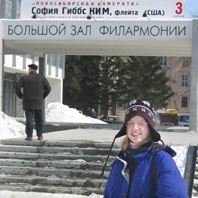
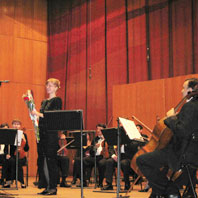 Sophia Gibbs Kim (MM ’98), the Jack L. Frank Instructor in flute in Eastman’s Community Music School, recently returned from a five-week stay in Siberia — as a participant in an exciting opportunity to bridge two countries through music. As a member of the American-Russian Young Artists Orchestra (ARYO) she played in a five-week residency with Novosibirsk Philharmonic, only the third American musician to play within a Russian orchestra.
Sophia Gibbs Kim (MM ’98), the Jack L. Frank Instructor in flute in Eastman’s Community Music School, recently returned from a five-week stay in Siberia — as a participant in an exciting opportunity to bridge two countries through music. As a member of the American-Russian Young Artists Orchestra (ARYO) she played in a five-week residency with Novosibirsk Philharmonic, only the third American musician to play within a Russian orchestra.
ARYO, a child of Glasnost, was founded in 1987 as a diplomatic initiative to bring the then Cold War superpowers together in an unprecedented partnership centered on young people and music. It has since gained international recognition as a world-class musical ambassadorship and training program.
Novosibirsk, deep in the heart of Siberia, is Russia’s third largest city. Sophia lived with a clarinetist in the Novosibirsk orchestra and his wife, a flutist in the city’s opera orchestra. She participated in day-to day-activities of the orchestra, performed in a concerto concert and in a solo recital, and taught at the Special School for Gifted Children, comparable to Eastman’s Community School. “Making music with Russian musicians is a very emotional experience,” says Sophia. “They really care about every phrase.”
Sophia’s concerto performance included two Eastman-related works: Night Soliloquy by the late Kent Kennan (BM ’34, MAS ’36), and the Serenade by Howard Hanson, Eastman’s most famous director. Her solo recital also included Kokopelli by ESM alumna Katharine Hoover (BM ‘59). “The Russians are very excited by American music, and by all new things,” says Sophia. “They really loved them. I was pleased to find that even in Siberia, musicians have heard of Eastman! I had instant credibility because they introduced me as ‘from Eastman.’”
“It was truly an amazing experience, like visiting another world,” says Sophia. “Before leaving, I was so concentrated on the concert preparation, it was all about the music. Once I was in Russia, it became a much larger experience, about people and about life.”
Famed Opera Composer Visits Eastman
April 2004
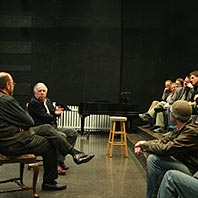
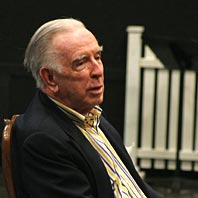 An Eastman Opera Theatre opening night is always exciting, but for this spring’s production of Susannah, there was extra excitement in the air. Carlisle Floyd, the composer of this famous American work was in the audience. The 77-year-old composer, whose other operas include Wuthering Heights and Of Mice and Men, visited Eastman on April 1. During the day he gave an informal talk to voice and opera students; he also gave a pre-performance talk to the Friends of Eastman Opera, and took a bow onstage at the end of the first performance.
An Eastman Opera Theatre opening night is always exciting, but for this spring’s production of Susannah, there was extra excitement in the air. Carlisle Floyd, the composer of this famous American work was in the audience. The 77-year-old composer, whose other operas include Wuthering Heights and Of Mice and Men, visited Eastman on April 1. During the day he gave an informal talk to voice and opera students; he also gave a pre-performance talk to the Friends of Eastman Opera, and took a bow onstage at the end of the first performance.
Since its premiere in 1955, Susannah has become the most frequently produced of all American operas, with over 700 productions all over the world. The Eastman production, with stage direction by Steven Daigle and musical direction by Benton Hess, ran from April 1-4 in the Eastman Theatre.
A Fine Old Sherry!
March 2004
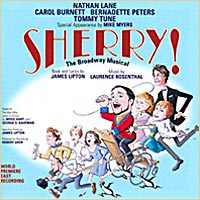
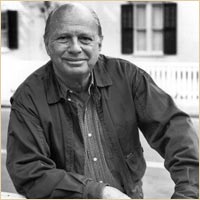 When the Broadway musical Sherry! — based on The Man Who Came to Dinner — opened in 1967, it had a brief run, and its entire score was thought to have been burned after the last performance, along with the scenery. More than 30 years later, a trunkful of Sherry! was discovered at the Library of Congress: the complete score and orchestra parts from the original production.
When the Broadway musical Sherry! — based on The Man Who Came to Dinner — opened in 1967, it had a brief run, and its entire score was thought to have been burned after the last performance, along with the scenery. More than 30 years later, a trunkful of Sherry! was discovered at the Library of Congress: the complete score and orchestra parts from the original production.
But by this time, the show’s author, James Lipton, was the host of TV’s popular Inside the Actor’s Studio , and its composer, Laurence Rosenthal (BM ’47, MM ’51) a prolific composer for movies and TV. And so the recording became a reality. Lipton persuaded a number of theater stars to take part in the premiere recording of Sherry! , which was released as a 2-CD set by Angel Records on February 24. (The second CD includes DVD excerpts from interviews with the stars and from a Bravo! special about the recording.) Rosenthal — who has won seven Emmy Awards and two Oscar nominations – took an active part in reconstructing his score and in attending the recording sessions.
The new recording of Sherry! created excitement among musical theater fans for bringing back a forgotten bit of Broadway history with a top-notch cast including Nathan Lane, Carol Burnett, Bernadette Peters, and Tommy Tune — with Rosenthal and Lipton themselves in bit parts. With the success of the Sherry! CD, there is even talk of reviving the show on Broadway.
Eastman Grad Hired at St. Patrick’s Cathedral
February 2004
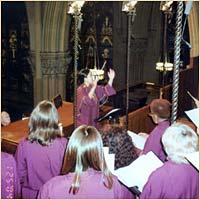
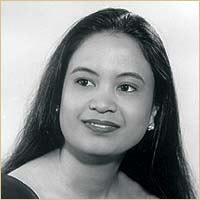 Jennifer Pascual ’01, who was awarded the DMA in organ performance from Eastman in 2001, was recently hired for one of the most prestigious jobs in American church music: Director of Music at New York’s St. Patrick’s Cathedral.
Jennifer Pascual ’01, who was awarded the DMA in organ performance from Eastman in 2001, was recently hired for one of the most prestigious jobs in American church music: Director of Music at New York’s St. Patrick’s Cathedral.
Jennifer, a former student of David Higgs, was appointed on September 1, 2003, by His Eminence, Edward Cardinal Egan, Archbishop of New York. Her duties include choosing and overseeing the music for services seven days a week (including five weekend masses), as well as many other events. She also leads a choir of 16 professional singers and volunteers, and supervises a staff that includes two full-time organists (besides herself) and an administrative assistant — “all jobs for which I was well trained at Eastman,” she says.
In addition, Jennifer conducts the New York Archdiocesan Festival Chorale, and is an accompanist for the Boys Choir of Harlem, Inc.
Eastman Composer wins Fromm Commission
February 2004
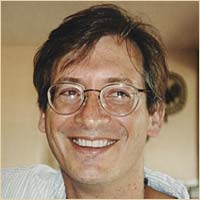 Associate professor of composition Ricardo Zohn-Muldoon is one of 12 winners of one of the most sought-after honors in contemporary composition: a 2003 commission from Harvard University’s Fromm Foundation. Zohn-Muldoon will use the $10,000 commission to write a substantial new piece for the Tarab cello ensemble (which was founded at Eastman).
Associate professor of composition Ricardo Zohn-Muldoon is one of 12 winners of one of the most sought-after honors in contemporary composition: a 2003 commission from Harvard University’s Fromm Foundation. Zohn-Muldoon will use the $10,000 commission to write a substantial new piece for the Tarab cello ensemble (which was founded at Eastman).
Founded in the 1950s by the late wine importer and contemporary music lover Paul Fromm, the Fromm Foundation has commissioned over 300 new works and sponsored hundreds of new music concerts. “I am in very lucky company!” says Zohn-Muldoon: previously commissioned composers include such great names as Luciano Berio, Elliott Carter, Luigi Dallapiccola, and Bruno Maderna.
The Fromm Foundation also awarded Zohn-Muldoon a month-long residency on the grounds of La Mortella, the beautiful home of another notable composer, Sir William Walton (1902-1983), on the Italian island of Ischia. Zohn-Muldoon will make the trip this summer with his family.
For more information on Paul Fromm and on the Fromm Foundation, visit www.fas.harvard.edu/~musicdpt/fromm.html.
Eastman Professor to receive Susan B. Anthony Award
January 2004
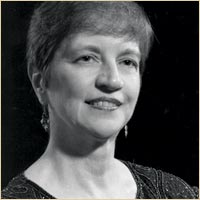 Professor of Accompanying and Chamber Music Jean Barr, who just celebrated her 15th year of teaching, is the first Eastman professor to receive the University of Rochester’s 2003 Susan B. Anthony Lifetime Achievement Award .
Professor of Accompanying and Chamber Music Jean Barr, who just celebrated her 15th year of teaching, is the first Eastman professor to receive the University of Rochester’s 2003 Susan B. Anthony Lifetime Achievement Award .
The Award, established in 1997 by the University’s Anthony Center for Women’s Leadership is given to a member of the University of Rochester faculty, staff, trustees, and/or alumni who has:
- Achieved significant professional stature and influence
- Created a commendable, trailblazing body of work
- Used her experience and skills to help other women advance as leaders.
The Susan B. Anthony Award, named after the famous American champion of women’s rights and Rochester native, is awarded only once a year. Professor Barr will receive the award in a ceremony on February 5, 2004.